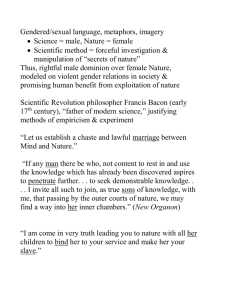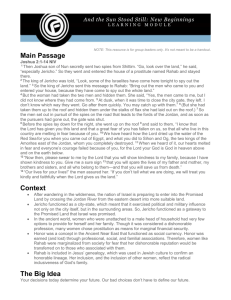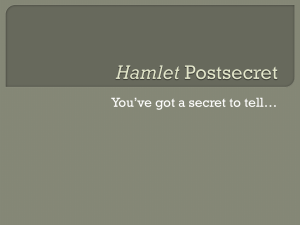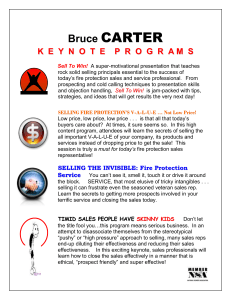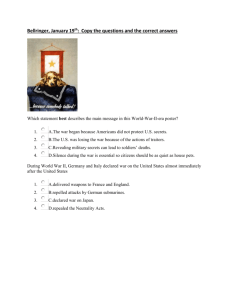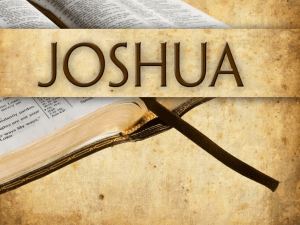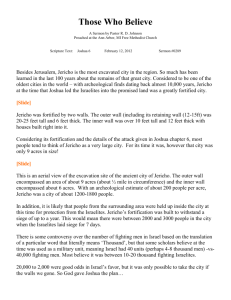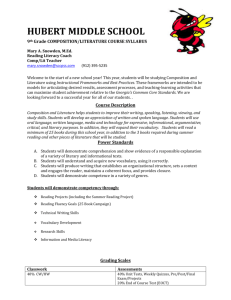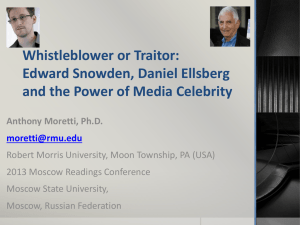WIKILEAKS, WHISTLEBLOWING, AND BETRAYAL Sermon
advertisement
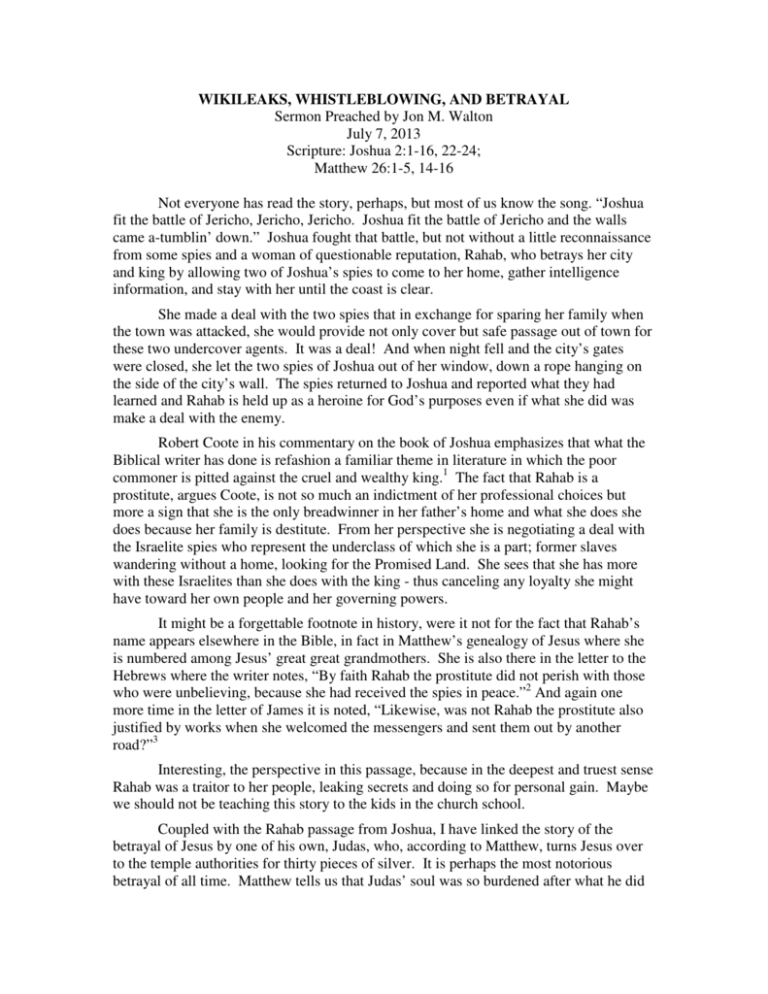
WIKILEAKS, WHISTLEBLOWING, AND BETRAYAL Sermon Preached by Jon M. Walton July 7, 2013 Scripture: Joshua 2:1-16, 22-24; Matthew 26:1-5, 14-16 Not everyone has read the story, perhaps, but most of us know the song. “Joshua fit the battle of Jericho, Jericho, Jericho. Joshua fit the battle of Jericho and the walls came a-tumblin’ down.” Joshua fought that battle, but not without a little reconnaissance from some spies and a woman of questionable reputation, Rahab, who betrays her city and king by allowing two of Joshua’s spies to come to her home, gather intelligence information, and stay with her until the coast is clear. She made a deal with the two spies that in exchange for sparing her family when the town was attacked, she would provide not only cover but safe passage out of town for these two undercover agents. It was a deal! And when night fell and the city’s gates were closed, she let the two spies of Joshua out of her window, down a rope hanging on the side of the city’s wall. The spies returned to Joshua and reported what they had learned and Rahab is held up as a heroine for God’s purposes even if what she did was make a deal with the enemy. Robert Coote in his commentary on the book of Joshua emphasizes that what the Biblical writer has done is refashion a familiar theme in literature in which the poor commoner is pitted against the cruel and wealthy king.1 The fact that Rahab is a prostitute, argues Coote, is not so much an indictment of her professional choices but more a sign that she is the only breadwinner in her father’s home and what she does she does because her family is destitute. From her perspective she is negotiating a deal with the Israelite spies who represent the underclass of which she is a part; former slaves wandering without a home, looking for the Promised Land. She sees that she has more with these Israelites than she does with the king - thus canceling any loyalty she might have toward her own people and her governing powers. It might be a forgettable footnote in history, were it not for the fact that Rahab’s name appears elsewhere in the Bible, in fact in Matthew’s genealogy of Jesus where she is numbered among Jesus’ great great grandmothers. She is also there in the letter to the Hebrews where the writer notes, “By faith Rahab the prostitute did not perish with those who were unbelieving, because she had received the spies in peace.”2 And again one more time in the letter of James it is noted, “Likewise, was not Rahab the prostitute also justified by works when she welcomed the messengers and sent them out by another road?”3 Interesting, the perspective in this passage, because in the deepest and truest sense Rahab was a traitor to her people, leaking secrets and doing so for personal gain. Maybe we should not be teaching this story to the kids in the church school. Coupled with the Rahab passage from Joshua, I have linked the story of the betrayal of Jesus by one of his own, Judas, who, according to Matthew, turns Jesus over to the temple authorities for thirty pieces of silver. It is perhaps the most notorious betrayal of all time. Matthew tells us that Judas’ soul was so burdened after what he did that he tried to return the blood money to the chief priests and the elders, but they refused, and he went out and hanged himself. Maybe another story we should not be teaching the kids. What I find interesting in these two stories from quite different periods in Israel’s history is that it depends on who’s telling the story as to whether the person in question is a villain or not. Rahab, though she turns on her own people, chooses the right side, not only the winner of the battle of Jericho, but also God’s people and thus becomes a part of salvation history. Judas, on the other hand, is the archetypal traitor, and while there is nothing meritorious about his actions, there is also no one there to explain why he did what he did. After all, Jesus must have seen something good in him for him to be called among the Twelve. Some novelists and writers have suggested that Judas was trying to force Jesus’ hand, to urge him into a showdown with the temple authorities or even the Romans. Some of the gospel writers seem to suggest that Judas is acting according to a preordained plan, that all that he does is written in the stars, “Friend, do what you are here to do,” Jesus tells Judas in the Garden of his arrest, as if this is Judas’ destiny. Matthew, in the end, is more blunt; for thirty pieces of silver Judas is willing to betray his friend. Intelligence gathering, spying, betrayal and leaking secrets obviously are not new to the human condition. We need only note Rahab and Judas to see that passing sensitive information has been around a long time. Edward Snowden, you have done nothing new under the sun! And spying is almost a daily story this summer. The Chinese are trying to read our computer programs and disrupt our defense systems and learn our secrets. The Russians are up to the same tricks, too. As are we... slowing down Iranian centrifuges to inhibit the enhancement of uranium (some say). The Biblical admonition that “what is whispered in secret shall be shouted from the rooftops” has suddenly come true.4 And many of us wish it weren’t the case. It’s not that we didn’t imagine that our government had secrets; it’s just that we really would rather not know very much about it, to tell you the truth. Which is, if you think about it, a rather naïve position to take in a democratic society that depends on an informed and conversant electorate. Ever since World War II we have worried about states gathering secrets. Hitler and Stalin and Tito come to mind. The dark days of the Cold War. We know that governments spy on their citizens and use that information against them or in some cases make them disappear as in Argentina and Chile and El Salvador. “But we aren’t like that,” or so we thought. Along came 9/11 and ever since we have wanted our government to be keeping a closer eye on things than we imagined they had before. We don’t want to be caught with our pants down in the same way again. The passage of the Patriot Act was one of those expressions of the need to lean away from personal freedom toward a more aggressive pursuit of those present in our country who intend us harm. And every now and then when someone tries to set off a 2 bomb in Times Square or decides to place a pressure cooker full of shrapnel and explosives in the midst of a crowd of cheering onlookers at the Boston Marathon, we have been quietly supportive of a rather aggressive surveillance of our neighbors and ourselves. But such vigilance comes close to infringing on the First Amendment guaranteeing free speech and association. Suddenly the plot has thickened. An Edward Snowden, or a Bradley Manning releases information that we have been trying to imagine we did not know was being collected. Like Captain Renault in the movie Casablanca who when he closes down Rick’s American Cafe, announces hypocritically, “I am shocked, shocked to find that gambling is going on here,” as the croupier hands him a stack of money and says, “Your winnings, sir.” So we need to acknowledge that the truth is often what we did not want to know and have tried to ignore. Statecraft is a dirty business. It always has been. Lord Acton had it right when he wrote in a letter to Bishop Mandell Creighton in 1887: "Power tends to corrupt, and absolute power corrupts absolutely in such manner that great men are almost always bad men."5 That’s the whole quote. It was Reinhold Niebuhr who in the 1940’s and ‘50’s in the wake of World War II wrote of the difference between private morality and public morality. His doctrine of man noted that there is a self-righteousness to human nature that attempts to overcome the world’s political, social and economic powers and create a utopian expectation. But Niebuhr pointed out that that expectation bore an “illusion of the simple perfectibility of man ...[as his] own redeemer,” an idea that Niebuhr thought was both naive and an underestimate of the power of sin not only to corrupt people, but also to corrupt economic, social, and political systems. In recent weeks and months we have watched as one after another persons have exposed and made public information that might otherwise not have been widely known. If it were the secrets of the Chinese or the Russians revealed we might welcome the public exposure and think that a not surprising result of an undemocratic form of government. But when it’s our secrets that are told we are shocked, as if we had no idea such a thing could be happening, and we vilify the whistleblower, sometimes for good reason, sometimes for reasons we later come to view differently. I suppose all of us at work have seen things about which we have felt the desire to blow a whistle. Occupy Wall Street struck a chord with a lot of people, even some Wall Streeters, and the talking out loud about the mortgage mess and the selling out of America’s middle class was a whistle that should have gotten some blowing. But in the case of a Bradley Manning or an Edward Snowden, we are talking about the possibility of people not only unilaterally deciding to disrupt American foreign and domestic policy but also jeopardizing the lives and livelihood of other Americans around the world. Edward Snowden’s father, said of him recently that his son leaking secrets was not treasonous to the American people, but treasonous only to the American government. And while that’s a distinction that marks a subtle difference there is something 3 disingenuous about the fact that if Snowden did such a noble thing in his own eyes, does it not behoove him to step forward and give account of it to the American people and to our shared government rather than hide in the Moscow airport or seek asylum in Nicaragua? I believe strongly in the importance and the right of individuals to dissent, to resist wrong, and to protest what they see as evil, but there are consequences for doing so, and a just and civil society must rely on the accountability of all if we are to assure the rights and freedoms of everyone. Where would we be on this Independence Day Weekend as we celebrate our nation’s freedoms if it were not for people like the members of this congregation, John Rodgers, William Smith, William Livingston, Alexander MacDougal, the Sons of Liberty in this Church of the Patriots, as it was known, who dissented from unjust powers imposed upon them and challenged the authority of the British crown? That freedom that those patriots won came at a price, one which caused them to give account of their actions, in some cases, with their lives. But there is a vast difference between what they did, declaring a position and standing firm to defend it, and doing what Edward Snowden did by leaving the country and flying to Hong Kong, and publishing his papers, and then heading to Moscow, looking for someone to take him in. It seems to me that if what you have done is so important for the sake of revealing the truth, for the sake of justice, do you not then need to face the consequences of having told that truth? There is a certain sense of entitlement and privilege inherent in what Snowden did that ignores the rights of all the citizens he says he was protecting. And for that matter, when did transparency become the most important factor in international relations? It seems to me that transparency is not the highest value in a world where every nation has its secrets, like it or not. The question is not whether we have secrets, it’s how we use them that matters. And, granted, in a compromised world doing so is tricky. Snowden, it seems to me, is in a position very much like the first year surgical intern who has learned how to use a scalpel. Anyone can open up the body with a good, deep, well placed cut. The trick is in knowing what to do for the good once you’re in there. Not many of us are in the position of an Edward Snowden, and part of me wonders if he does not sometimes wish in these days if he could take it all back. But just in case there are any of us here today who are about to blow the lid on any matters of national secrecy; there might be a few relevant thoughts to consider about the choices all of us must make about blowing whistles and revealing other’s secrets. First of all, the values of personal ethics, the kind of ethics one might maintain with a close friend or a spouse... honesty, self revelation, holding no secrets, when applied to international relations is an impossible transition. In truth, the only real unifying tie between the two is the fact that both personal ethics and public ethics are marred by sin, and we had best not ignore Niebuhr’s warning that there are no pure motives in global politics – too much self interest for it to be otherwise. 4 Second, it is naive to imagine that our nation, good and striving for the good as it is, is a nation which has not done some things that are less than consistent with our stated values. The President has said that we should have a public debate on the balance between individual privacy and the government’s capacity to scan patterns in internet communication if that data collection might protect the lives of people who could be the subject of a terrorist attack, namely you and me. It is a reasonable request for a worthwhile conversation in a democratic society. For anyone, including Mr. Snowden, to imagine that foreign relations is not a messy business is silly, and that revealing one nation’s secrets without revealing all nations secrets does not clear the air of anything. Governments must often do business in gray areas, and sometimes confidentiality and secrecy are essential in leading to useful outcomes. Third, before blowing any whistles it’s important to discern as best you can who benefits most by the telling of this truth... yourself or those whose safety and vulnerability is jeopardized by your need to speak what you see as the whole truth (if any of us ever know what that is, the whole truth). Fourth, if you are going to take an oath not only to uphold the Constitution but also to defend the United States against all enemies foreign and domestic, it’s best to give prayerful consideration to the damage done to one’s word, and the value of it, when exposing the supposed compromised word of another. Fifth, if you are going to take 30 pieces of silver, or $200,000 a year, and throw it in the faces of the company and fellow workers who have trusted you, you had better be ready to reckon with the second thoughts with which Judas struggled when he found neither the betrayal nor the silver very satisfying. And sixth, if you have decided that you hold the Constitution and its concern for the common weal to be of the highest value, then it is best not to substitute one’s own values and needs as being more urgent and important than the common good. As Edward Brooks in an editorial in the New York Times has said, The founders did not create the United States so that some solitary 29year-old could make unilateral decisions about what should be exposed.6 Finally, if you are going to reveal confidential information that may jeopardize the life of other human beings, what you have to reveal had really better be awfully important. Because sometimes those revelations are life and death matters. I am not sure whether history will prove Edward Snowden or any of the other whistle blowers of recent history to be heroes or villains, Rahab or Judas. I only know that life is complex and while it is a good thing to be clear eyed and sure of the truth, that truth that seems so clear to only one is not always so clear to everyone. It is a messy, sinful, compromised world in which we live, and lest we have any illusions, until God’s kingdom comes, it’s pretty much going to continue to be the milieu in which we all have to make our way as best we can. God help us. © Copyright Jon M. Walton, 2013. 5 1 Robert B. Coote, The New Interpreter’s Bible, Vol. 2 (Nashville: Abingdon Press, 1998) 593. 2 11:31 3 2:25 4 Mt. 10:26 5 Letter to Bishop Mandell Creighton, April 5, 1887 published in Historical Essays and Studies, edited by J. N. Figgis and R. V. Laurence (London: Macmillan, 1907) 6 David Brooks, “The Solitary Leaker.” NYTimes, June 10, 2013. 6
